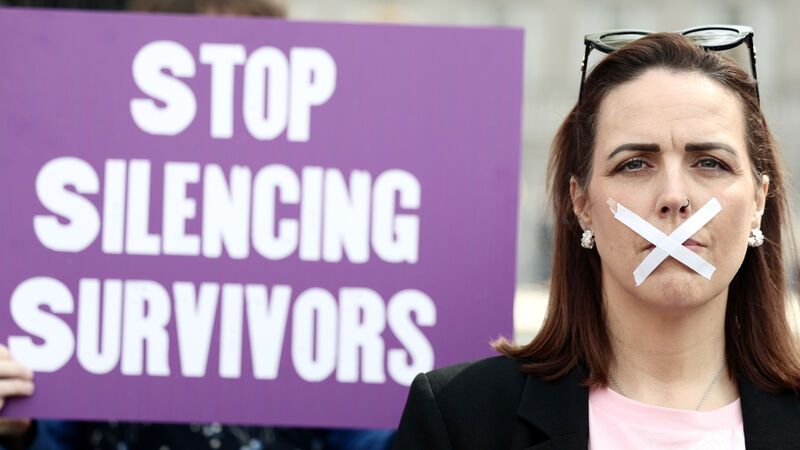Reforming court access to counselling notes must be carefully done

Hazel Behan, survivor and campaigner with survivors of sexual violence in front of the Dáil on Monday to hear Ruth Coppinger introduce her Bill at First Stage to outlaw counselling notes being used by defendants in gender-based violence trials. File photo: Leah Farrell/© RollingNews.ie
For victims of sexual violence, counselling is an understandably important part of the recovery process, and a fundamental feature of any counselling process is confidentiality.
Despite the importance of confidentiality in this context, the counselling notes of complainants in sexual offence trials have come to be regarded as a potential source of evidence. The 2025 Programme for Government contains a commitment to amend the law in this area. The question now is what this reform should look like.
Counselling creates a safe space for a client to express themselves openly. This is particularly important for victims of sexual violence as counselling necessarily involves the exploration of extremely sensitive and personal information with a client who is particularly vulnerable.
Disclosure of counselling notes is frequently sought during the investigation or trial process. Obviously, the experience of a request for disclosure of such records is traumatic for complainants due to the invasion of privacy entailed.
However, such disclosure is also problematic because of how this material may be used within a trial to challenge a complainant’s credibility. For example, such records may be mined for any inconsistencies between the complainant’s police statement and their discussion of the reported incident(s) of sexual violence in their therapy sessions.
Given the controversial nature of the use of counselling records in sexual offence trials, an effort to regulate this practice was introduced in 2017, creating a formal process which requires the defence to make an application to a judge where disclosure of counselling records is sought. Complainants are entitled to be heard at this hearing and to have legal representation (funded by legal aid) to support them in voicing their objections to disclosure.
The judge should only grant disclosure where the records are genuinely relevant to an issue in the trial and the application process is designed to guard against what lawyers call ‘fishing expeditions’ (i.e. spurious requests for access to records in the hopes that some potentially relevant information may be found therein).
While this legislation offers the potential to safeguard against unnecessary disclosure of counselling notes in sexual offence trials, in practice it has failed to achieve this. This is largely because the scheme includes a waiver process. Complainants may consent to disclosure of their counselling records, thereby obviating the need for the court application process.
It may seem counter-intuitive that complainants would voluntarily disclose their notes in this way. However, disclosure requests often come at a very early stage in the investigation process. While complainants will have the process explained to them, they may not at that stage fully comprehend how such notes may be used in a trial and that they may be used to challenge their evidence.
Further, research which I conducted with legal professionals who work within rape trials also suggested that complainants may waive the formal application process to avoid any associated delays which they fear may arise as a result. The upshot of the shortcomings of the 2017 reforms is that counselling notes continue to feature regularly as evidence in sexual offences trials.
While an outright ban on the disclosure of counselling notes was originally mooted in the 2025 Programme for Government, this is unlikely to be workable due to concern for defendants’ fair trial rights. Prohibiting disclosure completely would not allow for a situation where such records may include evidence which might be relevant to the defence.
However, there are a number of ways in which the law might be improved to ensure that counselling records are only disclosed where this is absolutely necessary.
One option would be to remove the waiver process, thereby ensuring that all requests for disclosure would require a court application. Another option is to include an additional layer in the legislative scheme which would regulate disclosure and also admissibility, that is, the use to which such records may be put in legal argument within the trial.
In this situation, even if disclosure were granted, it would not automatically mean that the evidence could be introduced in court. Defence counsel would also need to get approval from the judge to discuss the relevant material at trial. This would minimise the potential for such evidence to be used to unfairly prejudice a complainant's credibility.
A further issue which needs to be considered, and which has received scant attention to date, is whether the continued focus on counselling notes is too narrow. The Canadian legislation on which the current Irish rules on counselling notes is based protects all ‘personal records’, not just counselling notes.
Given that medical, social work, school or other personal files may contain similar information to counselling notes, it is arguable that they should also be protected by a legislative disclosure regime. This is particularly important as a successful curbing of the disclosure of counselling records would likely result in an increased focus on other personal records as evidence in trials.
There is a lot to consider when calibrating reform of this area. Consultation with relevant stakeholders, including victims of sexual violence, is essential to devise a workable scheme which effectively safeguards against unwarranted disclosure of counselling notes, whilst also avoiding any unintended consequences, such as the increased use of other categories of personal records.
While a solution is urgently needed, hasty, ill-considered legislative intervention may be at best pointless and at worst do more harm than good.
- Dr Susan Leahy is Associate Professor at the School of Law and Centre for Crime, Justice and Victim Studies, University of Limerick





